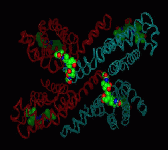The Electrostatic Properties of Alpha Helical Proteins


Student:
Brigit A. Schroeder, University of Minnesota
Advisors:
Dr. Daniel Ripoll, Cornell Theory Center
Dr. Carlos Faerman, Cornell University
Abstract:
The electrostatic properties of alpha helix proteins were studied by
investigating a subset of six proteins, which were classified by their
helical secondary structure: hemoglobin, C-phycocyanin, uteroglobin,
iron superoxide reductase, lambda repressor, and calcium-binding parvalbumin.
There was a general observation that the electrostatic properties of each
protein were enhanced as sidechain contributions were added, and that this
was reflected in the net dipole as well. The dipolar contributions from the
backbone were consistent in all proteins.